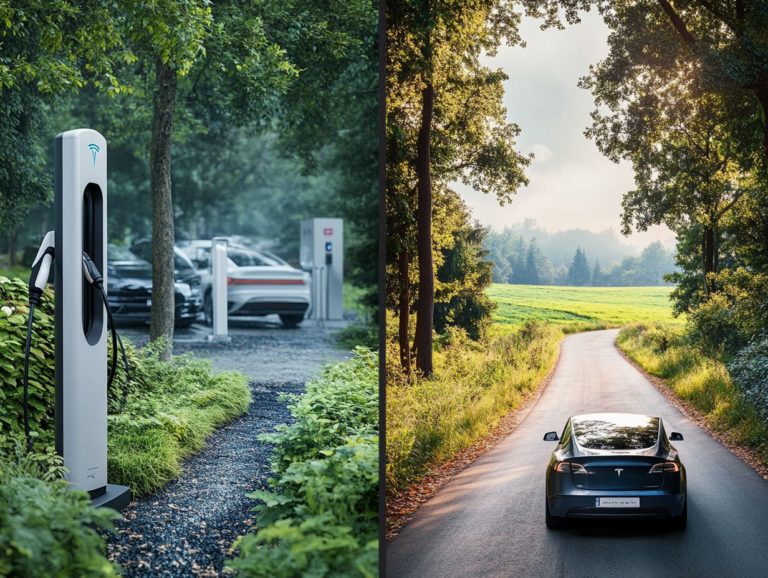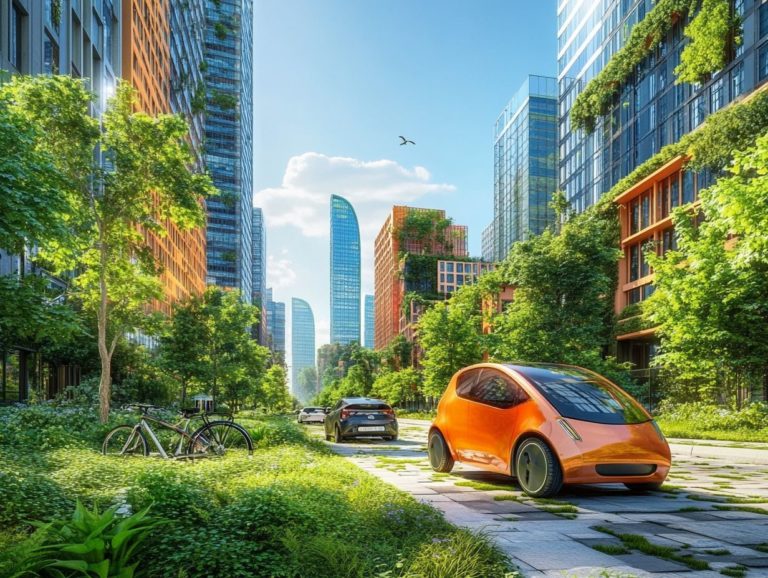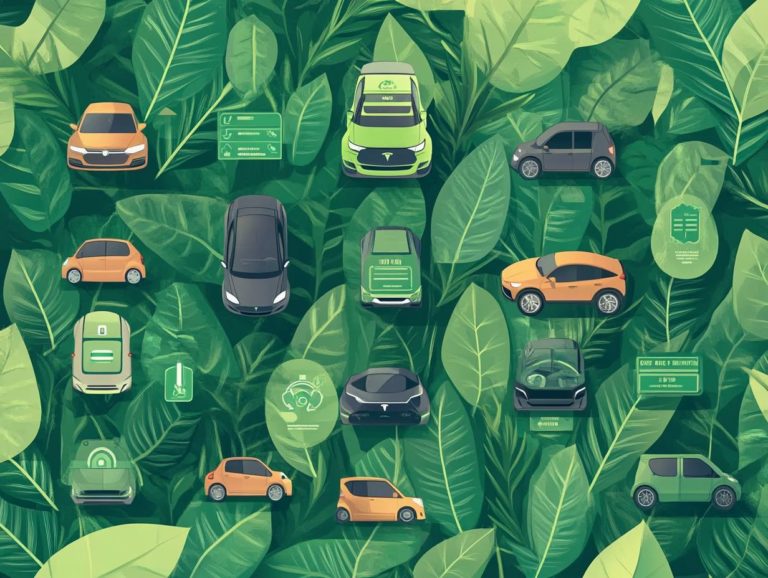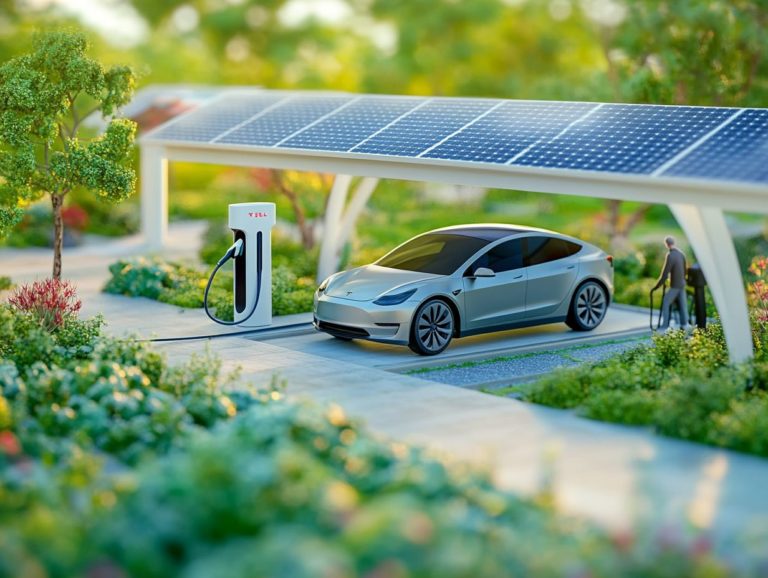Electric Vehicles and Their Role in a Sustainable Economy
Electric vehicles (EVs) are not merely a fleeting trend; they signify a crucial transformation in how we approach transportation and sustainability.
As you navigate the intricate landscape of climate change and economic challenges, understanding EVs and their advantages becomes vital. Their effects extend well beyond the roads, from cutting down harmful emissions to creating new job opportunities.
Hurdles like infrastructure and affordability raise legitimate concerns about widespread adoption. This article delves into the multifaceted role of EVs in a sustainable future, examining their environmental benefits, economic implications, and the support needed to propel their success.
Let s dive in and discover how electric vehicles can reshape our future!
Contents
- Key Takeaways:
- Benefits of EVs for the Environment
- Economic Impact of EVs
- Challenges and Barriers to Widespread Adoption
- Government Incentives and Policies
- The Future of EVs in a Sustainable Economy
- Frequently Asked Questions
- What are electric vehicles and how do they contribute to a sustainable economy?
- Are electric vehicles more expensive than traditional gasoline vehicles?
- How do electric vehicles impact the environment?
- What is the current state of the electric vehicle market?
- Can electric vehicles be charged at home?
- How do electric vehicles compare to traditional gasoline vehicles in terms of performance?
Key Takeaways:
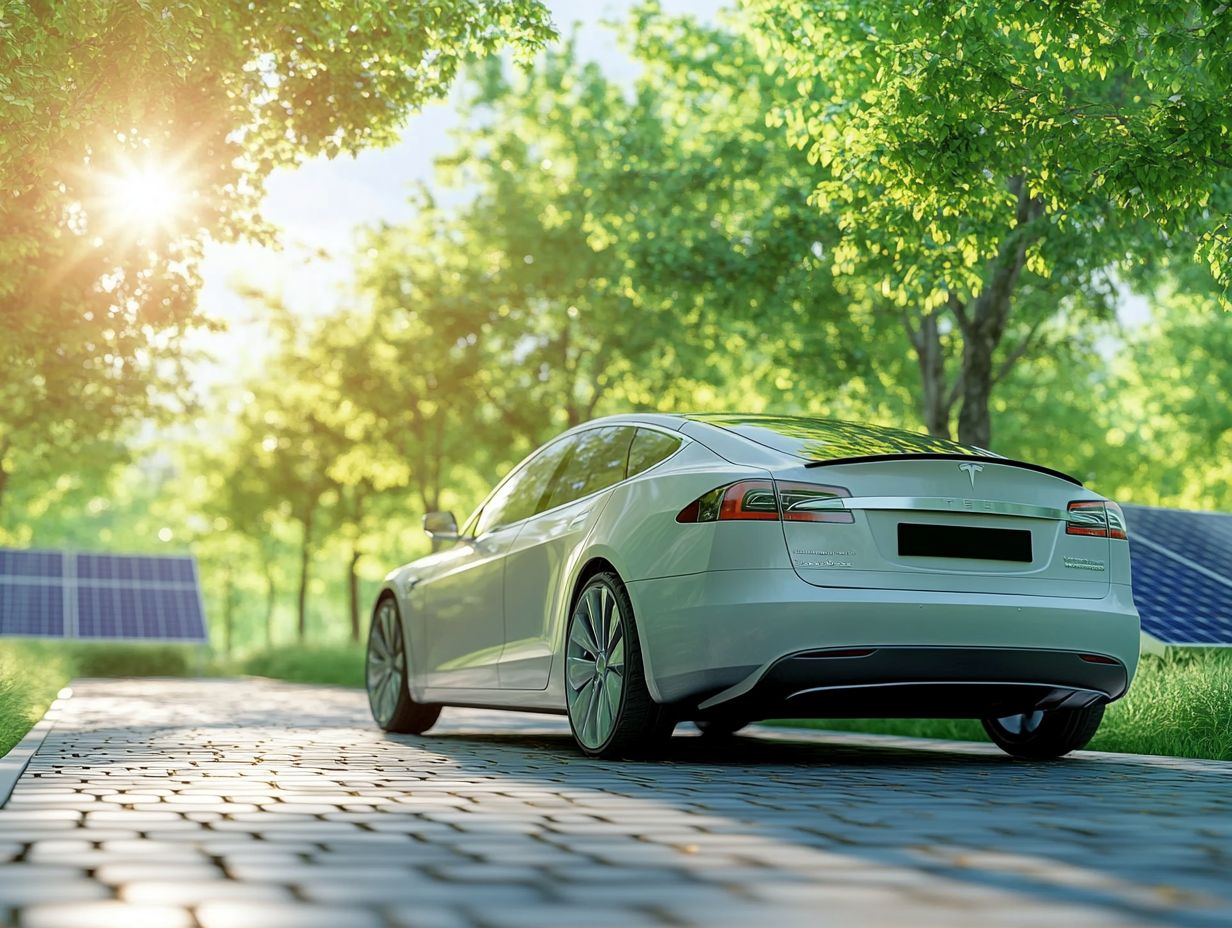
- Electric vehicles are a key solution for reducing emissions and combating climate change, making them crucial for a sustainable economy.
- Adopting electric vehicles boosts the economy by creating jobs and saving costs for individuals and businesses.
- Despite challenges, government incentives and policies are essential for promoting the growth and success of electric vehicles in a sustainable economy.
What are EVs and How Do They Work?
Electric vehicles (EVs) offer a revolutionary approach to transportation, harnessing electric power to reduce dependence on fossil fuels, tackle climate emissions, and enhance public health. These vehicles run on electricity stored in batteries, charged from clean energy sources. Additionally, the role of public transportation in EV sustainability further transforms urban traffic patterns and optimizes resource management.
With options like electric scooters and hybrid vehicles becoming critical in today s transportation culture, EVs emphasize eco-design and sustainable practices for a greener future.
The intricate architecture of EVs features components such as electric motors, energy-saving braking systems, and advanced battery management units. These components work together to provide an efficient driving experience. By drawing power from renewable energy sources like solar and wind, these vehicles significantly reduce greenhouse gas emissions, leading to cleaner air and better public health outcomes.
The rapid expansion of charging infrastructure in urban areas has made electric mobility more accessible than ever. This accessibility allows you to embrace a sustainable lifestyle while fostering a community-focused approach to transportation challenges. This approach aligns seamlessly with global clean energy objectives.
Benefits of EVs for the Environment
The environmental benefits of electric vehicles (EVs) are remarkable. By significantly reducing climate and greenhouse gas emissions, they contribute to improved public health and facilitate a transition toward a circular economy, which focuses on minimizing waste and maximizing resources.
By decreasing reliance on fossil fuels, EVs help lower air pollution and promote sustainable practices. They are indeed essential allies in the ongoing fight against climate change.
Reducing Emissions and Combating Climate Change
Electric vehicles play a pivotal role in reducing greenhouse gas emissions, effectively combating climate change by replacing fossil fuels with clean energy sources. This transition is crucial for environmental sustainability and aligns with global initiatives like the Paris Agreement, as highlighted in discussions about the future of sustainable mobility and electric vehicles, aimed at improving air quality and public health in urban areas.
By incorporating advanced battery technology and energy-saving braking systems, these vehicles significantly lower the carbon footprint typically associated with traditional gasoline or diesel engines. When charged with renewable energy sources like solar or wind, the emissions linked to electricity generation are minimized, creating a comprehensive approach to greenhouse gas reduction.
Your adoption of EVs encourages the development of supportive infrastructure, such as charging stations, fostering a broader shift toward a sustainable economy. As more governments and organizations recognize the necessity of reducing reliance on fossil fuels, the momentum behind electric vehicles is set to grow, particularly through advancements in battery technology for EV sustainability, solidifying their role in global climate change initiatives.
Economic Impact of EVs
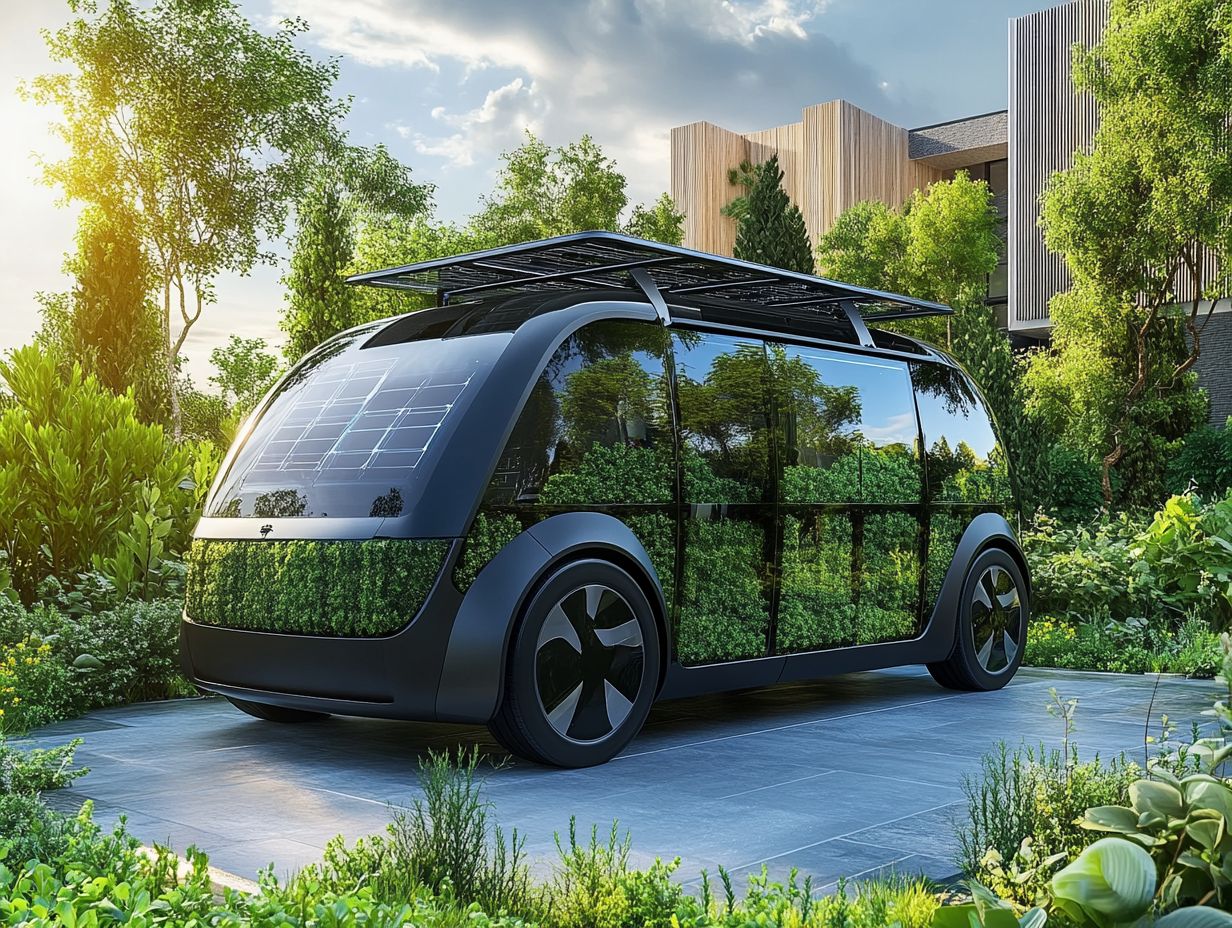
The economic impact of electric vehicles (EVs) goes well beyond their environmental advantages. They significantly influence job creation and cost savings across multiple sectors.
As you observe developing countries embracing electric mobility, you’ll see how reducing the up-front costs of traditional fossil fuel vehicles transforms transportation culture. This shift fosters innovation and paves the way for sustainable economic growth.
Job Creation and Cost Savings
Electric vehicles (EVs) offer a fantastic opportunity for job creation. As industries adapt to an electric fleet, new roles emerge in manufacturing, maintenance, and infrastructure development, highlighting the connection between EVs and sustainable living.
Consumers can save money over time with reduced fuel and maintenance costs associated with EVs. This shift not only enhances the economy but also promotes a sustainable transportation culture.
This transition opens new job opportunities in various fields, from engineering and design to sales and customer service. As more businesses integrate electric vehicles into their fleets, they can take advantage of these cost reductions to boost their profit margins, ultimately fostering a more sustainable transportation culture.
With the rising demand for charging stations and related infrastructure, you can expect a surge in job opportunities within the construction and renewable energy sectors, benefiting the economy as a whole.
Challenges and Barriers to Widespread Adoption
Despite the many advantages of electric vehicles (EVs), you ll encounter several challenges that may hinder their widespread adoption, particularly regarding infrastructure and affordability.
The initial price of EVs can deter potential buyers, especially when they often cost more than traditional vehicles. The lack of adequate charging stations and limited battery recycling options can easily dissuade consumers from transitioning away from traditional vehicles.
Infrastructure and Affordability Concerns
Infrastructure and affordability concerns are pivotal factors that profoundly influence your decision to adopt electric vehicles (EVs). This includes the availability of charging stations and the initial costs, which can deter many potential buyers. It s crucial to address these issues through strategic investments and policy incentives to ensure a seamless transition to electric mobility.
The expansion of charging infrastructure is essential for alleviating range anxiety, the fear of running out of battery while driving, which is common among potential EV users. When charging stations are more accessible and strategically positioned, you re more likely to think about making the switch from traditional gasoline vehicles.
Implementing solutions like subsidies or tax credits could substantially reduce the up-front costs of EVs, making them not just more enticing, but financially feasible for the average consumer.
Collaboration between government entities and private companies could accelerate the development of charging networks, creating an environment that encourages electric vehicle adoption.
Government Incentives and Policies
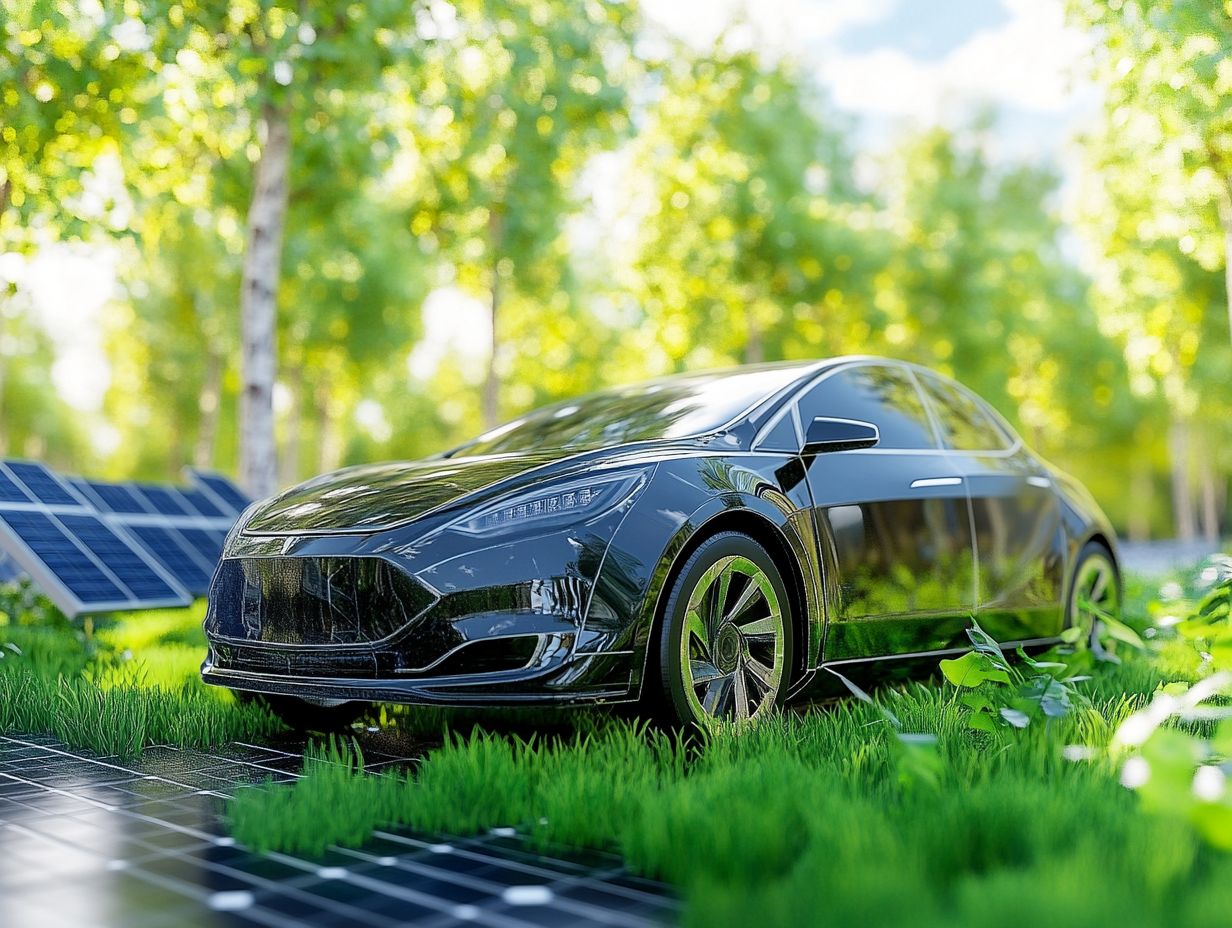
Government incentives play a key role in your switch to electric vehicles (EVs). With clean vehicle tax credits and other support, transitioning to this innovative technology becomes much easier.
These initiatives are vital in alleviating the up-front costs tied to EVs, creating a more favorable environment for electric mobility in your region.
Act now to benefit from these incentives and be part of the electric vehicle future!
Current and Future Support for EVs
Current and future support for electric vehicles (EVs) is essential for maintaining their momentum in the market. Government policies are evolving to align with the latest advancements in clean energy and the changing transportation culture. You can expect future initiatives to further incentivize EV adoption and strengthen the shift toward sustainable transportation practices!
Governments worldwide recognize the urgent need to reduce carbon emissions and are implementing a variety of measures to facilitate this transition. These measures include tax credits, rebates, and investments in charging infrastructure all designed to enhance the practicality of electric mobility options for you.
As renewable energy sources become more integrated into the grid, the environmental benefits of driving EVs continue to grow. These efforts not only strive to foster a more sustainable transportation culture but also aim to stimulate economic growth through job creation within the clean energy sector.
The interaction between policy and innovation will surely define the future landscape of both mobility and energy consumption for everyone.
The Future of EVs in a Sustainable Economy
The future of electric vehicles (EVs) is closely tied to the evolution of a sustainable economy. Predictions indicate a significant rise in adoption rates, fueled by advancements in clean energy and the role of electric vehicles in sustainable transportation, which focus on minimizing waste and maximizing resources.
As technological innovations continue to unfold, you can expect EVs to take center stage in transforming transportation and resource management practices.
Predictions and Potential Impact
Future predictions for electric vehicles (EVs) suggest they will have a transformative impact on urban traffic congestion and resource management. Their widespread adoption is expected to reshape the future of electric vehicles in sustainable cities, redefining transportation dynamics within a sustainable economy.
With advancements in clean energy and technology, you can anticipate that EVs will become a cornerstone in the fight against climate change and in enhancing public health!
As cities embrace electrification, you may witness a significant reduction in pollution levels and improved air quality. With more residents opting for EVs, the overall dependence on fossil fuels will decline, easing the burden on urban infrastructure. Innovative energy solutions, such as vehicle-to-grid technology which allows EVs to send excess power back to the grid during peak demand could revolutionize how cities manage energy distribution.
As urban planners and policymakers integrate these vehicles into existing transport systems, you re likely to see smarter traffic management emerge, alleviating common bottlenecks and creating a more seamless commuting experience.
Frequently Asked Questions
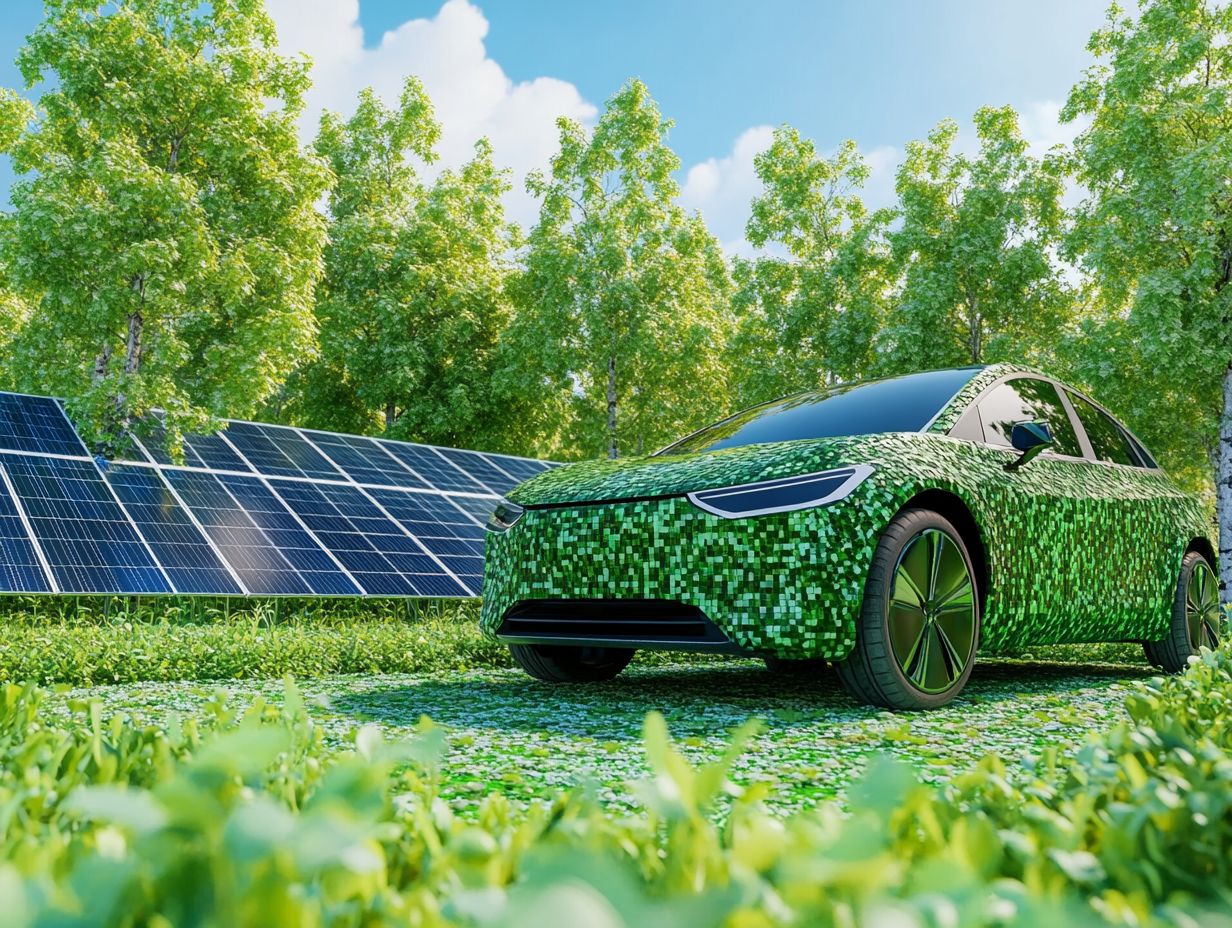
What are electric vehicles and how do they contribute to a sustainable economy?
Electric vehicles are vehicles that run on electricity instead of traditional fossil fuels. They contribute to a sustainable economy by reducing carbon emissions and playing a significant role in climate change by decreasing our dependence on non-renewable resources.
Are electric vehicles more expensive than traditional gasoline vehicles?
While electric vehicles may have a higher upfront cost, they often have lower operating and maintenance costs, making them a more affordable option in the long run.
How do electric vehicles impact the environment?
Electric vehicles have zero emissions, meaning they do not release harmful pollutants into the air. This helps to improve air quality and mitigate the negative effects of climate change!
What is the current state of the electric vehicle market?
The electric vehicle market is rapidly growing, with more manufacturers offering electric vehicle options and governments implementing policies to encourage their adoption. Join the movement towards a cleaner planet by switching to an EV today!
Can electric vehicles be charged at home?
Yes, electric vehicles can be charged at home using a regular household outlet or a faster charging station. This makes them convenient for daily use and eliminates the need for frequent trips to a gas station.
How do electric vehicles compare to traditional gasoline vehicles in terms of performance?
Electric vehicles have lower maintenance costs. They often provide quicker acceleration and a smoother driving experience compared to traditional gasoline vehicles.
However, keep in mind that the range of electric vehicles can be limited. This depends on the model and driving conditions. Ready to explore the benefits of going electric?

